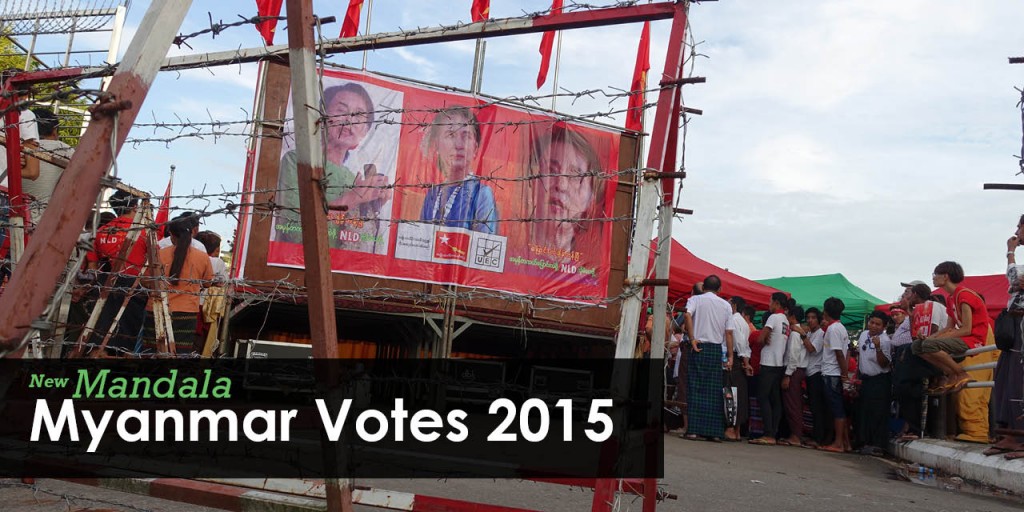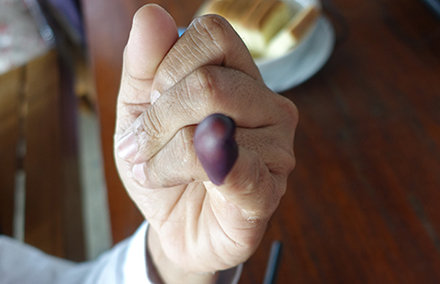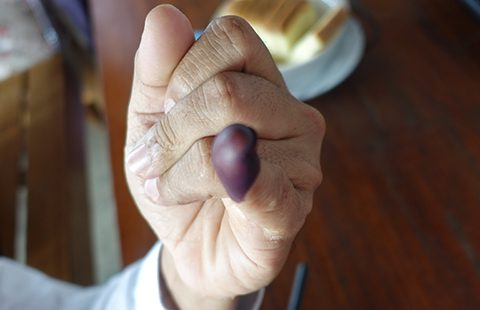
Voting and the day after in Myanmar’s capital, Naypyitaw.
As the sun rose over the Shan mountains yesterday, Naypyitaw’s military and civil servants joined the country to cast their vote.
A Colonel from the military tells me: “There was no line for us. The voting process was organised systematically.
“We had set times to vote, and there were several people checking our names and identification cards.”
He was voting in Zeyathiri, one of Naypyitaw’s eight townships, and predominantly home to families of military personnel.
Handing me his iPad, the Colonel opened his Facebook feed to show me images of Commander-in-Chief Min Aung Hlaing placing his vote at a polling station inside the military compound in Zeyathiri.
Not everyone faced such organised voting procedures.
“Of course it was quick for you. Everything’s systematic in the military!” his friend criticises.

The colonel’s finger. Photo: Olivia Cable
A civil servant complains in a light tone of the long queues in Zabuthiri Township.
“We only had one person checking our names and identification cards at the front of the school! I spent three hours and twenty minutes waiting!
“I should have planned the morning better, like how to skip the queue. Babies and old people often work in situations of long queues, to get to the front of the line”, she adds in a tone of amusement.
On the other side of town lies Myoma market. Behind it is the school where President Thein Sein placed his vote. Police vehicles were parked every hundred metres or so, each with two watchman–one wired to a radio, another gripping his rifle.
Over the past month, many civil servants have told me how free they felt to vote for the party of their choice. For instance, a staff officer in his late 20s told me a senior civil servant in his ministry has been running in a constituency outside Naypyitaw. The candidate encouraged his staff to “vote as you like”.
Civil servants also outlined their preferred party–and it was a healthy mix.
A woman in her early-30s explained her criteria.
“I didn’t vote for the USDP or NLD. I want to support new parties and new politicians. I voted for a candidate who had a good education, is committed to Buddhism and had a strong social conscience.”
Another woman told me she cast her vote based on the candidates education, age and their history.
“If they’re old, they won’t be good. If they’ve had a good education, they can think. If they have a good background, they can be trusted”.
Yet despite the impartiality in the civil service sector, Naypyitaw’s civil servants were hard to come by during the political campaigning. Over the past couple of weeks, rallies have taken place during office hours, and their neighbourhoods have been isolated from campaign activities.
In a conciliatory tone, a staff officer in his late-20s talks about President Thein Sein and Commander-in-Chief Min Aung Hlaing.
He reminds me: “U Thein Sein and Min Aung Hlaing have told Myanmar people that they will respect the voters wish. They will collaborate with the winning party. They have told us they will receive the desire of Myanmar people. I trust them.”
As a young civil servant, he is proud for the new trajectory Myanmar is following.
“Yesterday, I felt so strong for my country. We need to build Myanmar, and ‘un-hash’ the democratic system.”
Today, staff in government offices have spent much of the day tuned into their phones, radios and televisions, waiting for the results.
As one NLD supporter remarks “The new government should change the economic model so that we can be more like Singapore or Korea.”
The day after the elections, the sun goes down over the Bago mountains.
In one ministry, while nobody is talking about who they voted for, they are acutely aware that today’s results have marked a turning point for the country.
Olivia Cable is a lecturer in the Department of International Relations, Yangon University, and a research assistant in the Coral Bell School of Asia Pacific Affairs, the Australian National University.
This article forms part of New Mandala’s ‘Myanmar and the vote‘ series.
 Facebook
Facebook  Twitter
Twitter  Soundcloud
Soundcloud  Youtube
Youtube  Rss
Rss 